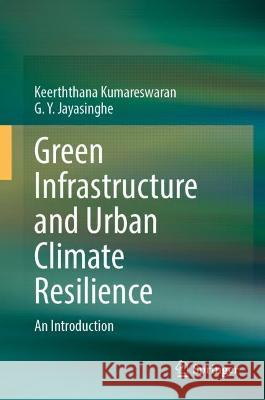Green Infrastructure and Urban Climate Resilience » książka
Green Infrastructure and Urban Climate Resilience
ISBN-13: 9783031370809 / Angielski / Twarda / 2023
Green Infrastructure and Urban Climate Resilience
ISBN-13: 9783031370809 / Angielski / Twarda / 2023
(netto: 383,36 VAT: 5%)
Najniższa cena z 30 dni: 346,96
ok. 16-18 dni roboczych.
Darmowa dostawa!
This book aims to cover most subject areas of green infrastructure such as components, multi-functionality, and integration to build environment, contribution to urban sustainability, sustainable and smart city development, urban climate change nexus, green buildings and rating systems, economic assessment, and quantification of green infrastructure. The impending climate crisis, as well as the ongoing COVID-19 pandemic, has highlighted the importance of green infrastructure in and around cities, prompting a call for more functional and sustainable urban planning and design. A number of recent studies have shown that green infrastructure provides a wide range of ecosystem functions and services critical to human well-being and urban sustainability, which is especially important during climatic and health crises. In this book, the authors emphasize the importance of existing green infrastructure in coping with climate change-induced stresses, such as increasing climate variability and extreme temperature and precipitation events, as well as contributing to urban dwellers' physical and mental health. Green infrastructure, in both cases, plays a significant role in providing urban areas with resilience capacity, which is critical to urban sustainability. The authors also emphasize the importance of expanding and improving green infrastructure, particularly in vulnerable areas, through integrative and participatory processes.Appropriate integration of green-gray infrastructure and development of climate resilient cities is the core theme of this publication. Further, it emphasizes sustainable development which has become an imperative requirement to the world to move fore and climate change-built environment nexus, the most critical global crisis. Though several books were published globally on the green infrastructure and urban resilience individually, books are rarely published combining both disciplines. This book identifies and addresses the gap through comprehensively discussing on both interlinked areas which is essential for the sustainable urban development. Further, it explores on urban climate resilience, urban sprawl, urbanization, resilience drivers, essentials of city resilience, policy implications, challenges, and future perspectives. This book is a useful fundamental guide in practical applications of green infrastructure in built environment in sustainability context. Further, it enlightens on the significance of transforming the conventional building construction trend to sustainable urban planning designs and building development, exploring on the strategic pathway on building urban climate resilience while signifying the importance of healthy built environment through discussing on the nexus between climate change and built environment.











